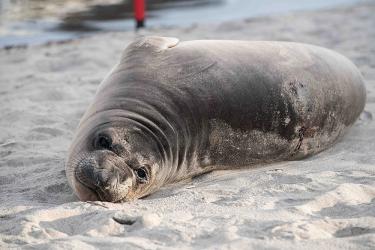Climate change is hitting fishermen hard. But it's not hitting all those who depend on the sea for their livelihood the same way.
A new NOAA Fisheries study examined how climate change might affect commercial fishing fleets on the U.S. West Coast. The findings were published recently in the journal PLoS Climate.
Researchers assessed the risk climate change poses to different bottom trawl groundfish fishing fleets in California, Oregon, and Washington.
They combined information about ocean conditions, fishing behavior, and the economy. They wanted to understand how climate change affects different fishing communities. And in turn, they hope this helps us figure out the best ways to help them adapt and thrive in a changing climate.
The research team included members from:
- NOAA Fisheries
- University of Washington
- The Nature Conservancy
- Oregon Department of Fish and Wildlife
- Oregon State University
- Wellesley College
- Scripps Institution of Oceanography
Location Matters: Northern Fishermen Face More Challenges
The researchers found that West Coast fishermen further north face a double whammy. First, fishermen nearer the poles may be exposed to more rapid changes in ocean climate. Climate models predict that northern ports may experience double the ocean temperature changes of their southern counterparts in the coming decades. Previous work showed that the warmer water pushes many groundfish (e.g., rockfish, sablefish) into cooler waters, forcing northern fishermen to fish much deeper or further offshore.
Second, these northern fishermen often rely more heavily on the specific fish they catch. For example, the researchers found that some northern fishermen are 10 times more economically dependent on groundfish than southern fishermen. Southern fishermen maintain more diverse fishing portfolios or rely more on other species. Northern fishermen will experience waters that warm faster and have fewer options for which species to target, so they are more vulnerable to a changing climate.
Different Solutions Needed for Different Situations
Climate change affects fishing fleets differently and requires different solutions. The researchers found that encouraging diversification, mobility, and market expansion can help fishing communities cope with climate impacts.
In particular, the researchers compared two adaptation strategies they called: adapting in place and adapting on the move. They note that some fishermen can adapt by catching different fish or moving to new areas, but this isn't always easy.
“We found that adapting to climate change by seeking more distant fishing grounds appears to be better at reducing risk for northern fishing fleets than diversifying fisheries portfolios,” said Jameal Samhouri, the study's lead author. “A key next step is to follow up with direct conversations with fishermen in their communities to determine if these findings ring true for them.”
But it’s often not that simple. The researchers point to a host of other considerations that affect the situation and adaptation strategy. For example, past events and regulations can affect how communities respond to the new challenges posed by climate change. We don’t know whether fishermen are already at their catch diversification and mobility limits.
That’s why the researchers stress that understanding each fishing community's specific risks and vulnerabilities is crucial for developing effective climate adaptation strategies. This research shows that climate change isn't a one-size-fits-all problem. While some fishermen face a rougher ride, understanding these differences is vital for finding the best ways to help them adapt.




